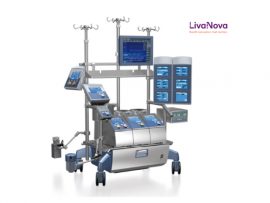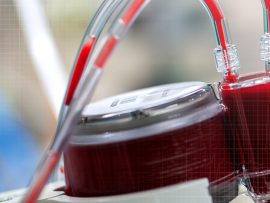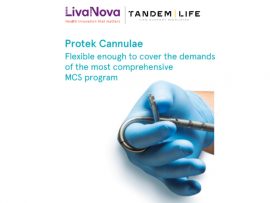Abstract Purpose Venoarterial extracorporeal membrane oxygenation (V-A ECMO) can be used to support severely ill patients with cardiogenic shock. While age is commonly used in patient selection, little is known..
Read MoreAbstract The recent study by Scolari et al. [] entitled ‘Association between serum lactate levels and mortality in patients with cardiogenic shock receiving mechanical circulatory support: a multicenter retrospective cohort..
Read MoreAbstract Background: VA-ECMO with concomitant Impella support (ECpella) is an emerging treatment modality for cardiogenic shock (CS). Survival outcomes by CS etiology with ECpella support have not been well-described. Methods: This study..
Read MoreAbstract Mechanical circulatory support (MCS) is an emerging therapy for acute heart failure (AHF) or cardiogenic shock (CS) patients unresponsive to medicinal treatment. In China, common treatments using short-term MCS..
Read MoreAbstract BACKGROUND: Although venoarterial extracorporeal membrane oxygenation (VA-ECMO) is beneficial for the treatment of profound cardiogenic shock, peripheral VA-ECMO cannulation can increase left ventricular afterload, thus compromising myocardial recovery. We..
Read MoreAbstract BACKGROUND Extracorporeal life support (ECLS) is increasingly used in the treatment of infarct-related cardiogenic shock despite a lack of evidence regarding its effect on mortality. METHODS In this multicenter..
Read MoreAbstract The use of intra-aortic balloon pump (IABP) has decreased in recent years due to negative outcome studies in cardiogenic shock complicating acute myocardial infarction, despite its favorable adverse-event profile...
Read MoreAbstract Objectives Coronary artery bypass grafting (CABG) surgery in patients with acute coronary syndrome (ACS) remains a high-risk procedure and is associated with adverse outcomes. The risk factors of acute..
Read MoreAbstract Background Myocardial injury-related cardiogenic shock (MICS) is significantly associated with poor outcomes in patients after cardiac surgery. Herein, we aimed to investigate the risk factor for postoperative MICS. Methods..
Read MoreAbstract Background Low cardiac power (product of flow and pressure) has been shown to be associated with mortality in patients with cardiogenic shock after acute myocardial infarction, but has not..
Read MoreAbstract Introduction: Critically ill patients with inflammatory dysregulation and organ disfunction may benefit from blood purification, although the use of this technique has not been described in large case series. We..
Read MoreAbstract Background Venoarterial (VA-ECMO) is increasingly used with despite the lack of evidence from adequately powered . Three trials reported so far were underpowered to detect a survival benefit; we therefore conducted an individual..
Read MoreAbstract Intraaortic balloon pump counterpulsation is the most common form of mechanical circulatory support used in patients with myocardial ischemia and cardiogenic shock. The physiologic principles of counterpulsation include diastolic..
Read MoreAbstract In patients with acute MI complicated by cardiogenic shock (AMICS) who are slated to undergo early revascularization, routine use of extracorporeal membrane oxygenation (ECMO) doesn’t reduce 30-day mortality. The..
Read MoreAbstract Background Venoarterial (VA-ECMO) is increasingly used with despite the lack of evidence from adequately powered . Three trials reported so far were underpowered to detect a survival benefit; we therefore conducted an individual..
Read MoreAbstract LAVA-ECMO has recently gained attention in the medical community, specifically, as support for cardiogenic-shock patients. In particular, interest has picked up since it was highlighted at the 2023 Houston..
Read MoreAbstract Introduction Cardiac output (CO) is a key determinant of oxygen delivery. Low cardiac output syndrome (LCOS) causes organ dysfunction, prolonged hospital stay, and reduces survival in perioperative settings and..
Read MoreAbstract Due to advances in critical care medicine over the past several decades, the number of survivors of critical illness continues to grow despite increased severity of illness (). There..
Read MoreAbstract Background Venoarterial extracorporeal membrane oxygenation (VA-ECMO) is a key support modality for cardiogenic shock. The 2018 United Network for Organ Sharing (UNOS) heart transplant allocation algorithm prioritizes VA-ECMO patients...
Read MoreAbstract The use of mechanical circulatory support using percutaneous ventricular assist devices (pVAD) has increased rapidly during the last decade without substantial new evidence for their effect on outcome. In..
Read MoreAbstract Background Venoarterial extracorporeal membrane oxygenation (VA-ECMO) is used as a rescue strategy for patients with refractory post-cardiotomy cardiogenic shock (PCS). These patients often have varying degrees of reduced hemoglobin..
Read MoreAbstract There are minimal data on the use of venoarterial extracorporeal membrane life support (VA-ECLS) in adult congenital heart disease (ACHD) patients presenting with cardiogenic shock (CS). This study sought..
Read MoreAbstract BACKGROUND Tricyclic antidepressant (TCA) drugs are a common cause of fatal poisoning because of their cardiotoxic and arrhythmogenic effects. Classic supportive management includes sodium bicarbonate, gastrointestinal chelating agents, and..
Read MoreAbstract This article describes a case study where a patient with ProtekDuo + oxygenator and Impella CP (PROpella) in biventricular failure and cardiogenic shock was reconfigured to venopulmonary-arterial (VP-A) extracorporeal..
Read MoreAbstract Objectives To perform a systematic review and meta-analysis of the techniques and outcomes associated with percutaneous decannulation of venoarterial extracorporeal membrane oxygenation (VA–ECMO) using the Manta vascular closure device...
Read MoreAbstract In the United States, about one million people are seen to visit the operating theater for cardiac surgery annually. However, nearly half of these visits result in complications such..
Read MoreAbstract BACKGROUND Post-cardiotomy veno-arterial extracorporeal membrane oxygenation (V-A ECMO) is characterized by discrepancies between weaning and survival-to-discharge rates. This study analyzes the differences between post-cardiotomy V-A ECMO patients who survived,..
Read MoreAbstract Percutaneous cannulation improved femoro-femoral veno-arterial Extracorporeal Membrane Oxygenation (VA-ECMO) results, reducing infectious complications, but remains limited by vascular complications related to the arterial decannulation. Several techniques were described to perform a percutaneous decannulation..
Read MoreAbstract The ProtekDuo® is a dual lumen cannula that can be used in numerous configurations to treat cardiogenic shock and hypotension. Its default function is as a temporary percutaneous right..
Read MoreAbstract Extracorporeal life support with venoarterial extracorporeal membrane oxygenation (VA-ECMO) is used to assist circulation in patients with severe cardiogenic shock or cardiac arrest. The vasoactive-inotropic score (VIS) is a standardized calculation of vasoactive medication support which uses..
Read More














